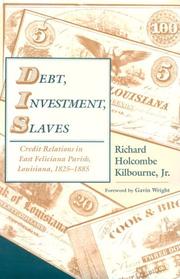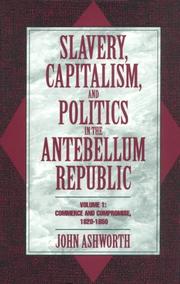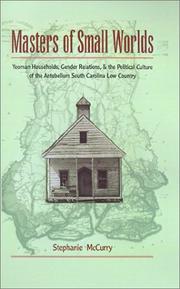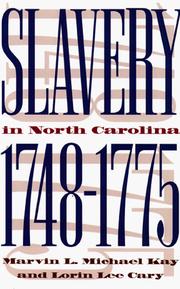| Listing 1 - 6 of 6 |
Sort by
|

ISBN: 0817387552 0585161682 0817307303 9780585161686 9780817307301 9780817387556 Year: 1995 Publisher: Tuscaloosa, Ala. University of Alabama Press
Abstract | Keywords | Export | Availability | Bookmark
 Loading...
Loading...Choose an application
- Reference Manager
- EndNote
- RefWorks (Direct export to RefWorks)
A thorough survey of parish mortgage records and other manuscript collections led to the conclusion that most credit relationships, collateralized and uncollateralized, were grounded in slave property as opposed to land or other forms of wealth. Uncollateralized debt was directly dependent on the relative wealth of parish residents, and the bulk of most portfolios consisted of slaves. Emancipation and the Civil War occasioned a monumental credit implosion from which the local economy never recovered, at least for the remainder of the 19th century.
Debt --- Slavery --- Credit --- History --- Borrowing --- Finance --- Money --- Loans --- Abolition of slavery --- Antislavery --- Enslavement --- Mui tsai --- Ownership of slaves --- Servitude --- Slave keeping --- Slave system --- Slaveholding --- Thralldom --- Crimes against humanity --- Serfdom --- Slaveholders --- Slaves --- Indebtedness --- Enslaved persons

ISBN: 0807102733 9780807102732 Year: 1995 Publisher: Baton Rouge, LA : Louisiana State University Press,
Abstract | Keywords | Export | Availability | Bookmark
 Loading...
Loading...Choose an application
- Reference Manager
- EndNote
- RefWorks (Direct export to RefWorks)
Written and oral testimony to the conditions and experiences of slavery reveal the everyday lives and extraordinary culture of black slaves.
Slavery --- Abolition of slavery --- Antislavery --- Enslavement --- Mui tsai --- Ownership of slaves --- Servitude --- Slave keeping --- Slave system --- Slaveholding --- Thralldom --- Crimes against humanity --- Serfdom --- Slaveholders --- Slaves --- History&delete& --- Sources --- History --- Enslaved persons --- CULTURE --- U.S. --- BLACK --- HISTORY --- SLAVERY --- BLACKS
Book
ISBN: 0585105162 9780585105161 1853312010 Year: 1995 Publisher: Edinburgh Keele University Press
Abstract | Keywords | Export | Availability | Bookmark
 Loading...
Loading...Choose an application
- Reference Manager
- EndNote
- RefWorks (Direct export to RefWorks)
In this classic short introduction to one of the most important and controversial topics in American history, Peter J Parish investigates slavery from political, economic and social perspectives. He explains the paradox upon which slavery rested: its guiding principle was that slaves were property, but its everyday practice demonstrated the impossibility of denying the slave's humanity. He takes the reader through the origin of the Slave system in the South, outlines the controversies surrounding the economics of slavery and asks what life for slaves was really like. This is the perfect starting point from which to explore American slavery's rich and controversial literature.
Slavery --- HISTORY / United States / General. --- History --- Southern States --- Southern States. --- History. --- Abolition of slavery --- Antislavery --- Enslavement --- Mui tsai --- Ownership of slaves --- Servitude --- Slave keeping --- Slave system --- Slaveholding --- Thralldom --- Crimes against humanity --- Serfdom --- Slaveholders --- Slaves --- Enslaved persons

ISBN: 0521479940 0521474876 051157231X Year: 1995 Publisher: Cambridge : Cambridge University Press,
Abstract | Keywords | Export | Availability | Bookmark
 Loading...
Loading...Choose an application
- Reference Manager
- EndNote
- RefWorks (Direct export to RefWorks)
The Civil War should be seen as America's 'bourgeois revolution'. So argues Dr John Ashworth in this novel reinterpretation, from a Marxist perspective, of American political and economic development in the forty years before the Civil War. This book, the first of a two-volume treatment of slavery, capitalism and politics, locates the political struggles of the antebellum period in the international context of the dismantling of unfree labor systems. With its sequel, the volume will demonstrate that the conflict resulted from differences between capitalist and slave modes of production. With a careful synthesis of existing scholarship on the economics of slavery, the origins of abolitionism, the proslavery argument and the second party system, Ashworth maintains that the origins of the American Civil War are best understood in terms derived from Marxism.
United States --- Politics and government --- 1815-1861 --- Economic conditions --- To 1865 --- Slavery - Economic aspects - United States - History - 19th century. --- Capitalism - United States - History - 19th century. --- Slavery --- Capitalism --- Working class --- Esclavage --- Capitalisme --- Travailleurs --- Economic aspects --- History --- Aspect économique --- Histoire --- Etats-Unis --- Politique et gouvernement --- Conditions économiques --- Arts and Humanities --- Market economy --- Economics --- Profit --- Capital --- Abolition of slavery --- Antislavery --- Enslavement --- Mui tsai --- Ownership of slaves --- Servitude --- Slave keeping --- Slave system --- Slaveholding --- Thralldom --- Crimes against humanity --- Serfdom --- Slaveholders --- Slaves --- Enslaved persons

ISBN: 142376465X 1280441291 1601298528 0199728127 9781423764656 9781601298522 9781280441295 6610441294 9780195072365 0195072367 9786610441297 9780199728121 0195072367 0197714617 Year: 1995 Publisher: New York Oxford University Press
Abstract | Keywords | Export | Availability | Bookmark
 Loading...
Loading...Choose an application
- Reference Manager
- EndNote
- RefWorks (Direct export to RefWorks)
This social history describes the yeomanry (small farmers) in South Carolina before the US Civil War. It focuses on the relationship between these farmers and the planters, with whom they had strong ideological ties. The study also deals with issues of gender and class.
Yeomanry (Social class) --- Social classes --- Political culture --- Culture --- Political science --- Class distinction --- Classes, Social --- Rank --- Caste --- Estates (Social orders) --- Social status --- Class consciousness --- Classism --- Social stratification --- History --- South Carolina --- Sex role --- Slavery --- Abolition of slavery --- Antislavery --- Enslavement --- Mui tsai --- Ownership of slaves --- Servitude --- Slave keeping --- Slave system --- Slaveholding --- Thralldom --- Crimes against humanity --- Serfdom --- Slaveholders --- Slaves --- Gender role --- Sex (Psychology) --- Sex differences (Psychology) --- Social role --- Gender expression --- Sexism --- Gender roles --- Gendered role --- Gendered roles --- Role, Gender --- Role, Gendered --- Role, Sex --- Roles, Gender --- Roles, Gendered --- Roles, Sex --- Sex roles --- Enslaved persons

ISBN: 080786238X 0585026483 9780585026480 9780807862384 0807821977 9780807821978 9798890871046 Year: 1995 Publisher: Chapel Hill London
Abstract | Keywords | Export | Availability | Bookmark
 Loading...
Loading...Choose an application
- Reference Manager
- EndNote
- RefWorks (Direct export to RefWorks)
A history of slavery.
Slavery --- Regions & Countries - Americas --- History & Archaeology --- United States - General --- Abolition of slavery --- Antislavery --- Enslavement --- Mui tsai --- Ownership of slaves --- Servitude --- Slave keeping --- Slave system --- Slaveholding --- Thralldom --- Crimes against humanity --- Serfdom --- Slaveholders --- Slaves --- History --- North Carolina --- State of North Carolina --- Carolina del Norte --- NC --- N.C. (North Carolina) --- N. Car. --- Noord-Carolina --- Carolina d'o Norte --- Estato de Carolina d'o Norte --- Şimali Karolina --- Штат Паўночная Караліна --- Shtat Paŭnochnai︠a︡ Karalina --- Паўночная Караліна --- Paŭnochnai︠a︡ Karalina --- Not Carolina --- Sjeverna Carolina --- Carolina an Norzh --- Norzhkarolina --- Северна Каролина --- Severna Karolina --- Щат Северна Каролина --- Shtat Severna Karolina --- Carolina del Nord --- Çурçĕр Каролина --- Śurśĕr Karolina --- Severní Karolína --- Gogledd Carolina --- Náhookǫsjí Kééláanah Hahoodzo --- Põhja-Carolina --- Põhja-Carolina osariik --- Βόρεια Καρολίνα --- Voreia Karolina --- Πολιτεία της Βόρειας Καρολίνας --- Politeia tēs Voreias Karolinas --- Estado de Carolina del Norte --- Norda Karolino --- Ipar Carolina --- Caroline du Nord --- Noard Karolina --- Carolina Thuaidh --- Carolina Hwoaie --- Poyraz Karolina --- Carolina a Tuath --- Ар Карелайн --- Ar Karelaĭn --- Norda-Karolina --- Nort Kárólínạ --- Carolina Utara --- Negara Bagian Carolina Utara --- Kaaruuliinaa tunuviaq --- Nigiq Carolina --- Цæгат Каролинæ --- T︠S︡ægat Karolinæ --- Norður-Karólína --- קרוליינה הצפונית --- Ḳarolinah ha-Tsefonit --- Karolina Gledh --- Karolin dinò --- Karolînaya Bakur --- Йыдвел Каролина --- Ĭydvel Karolina --- Province of North Carolina --- Enslaved persons
| Listing 1 - 6 of 6 |
Sort by
|

 Search
Search Feedback
Feedback About UniCat
About UniCat  Help
Help News
News